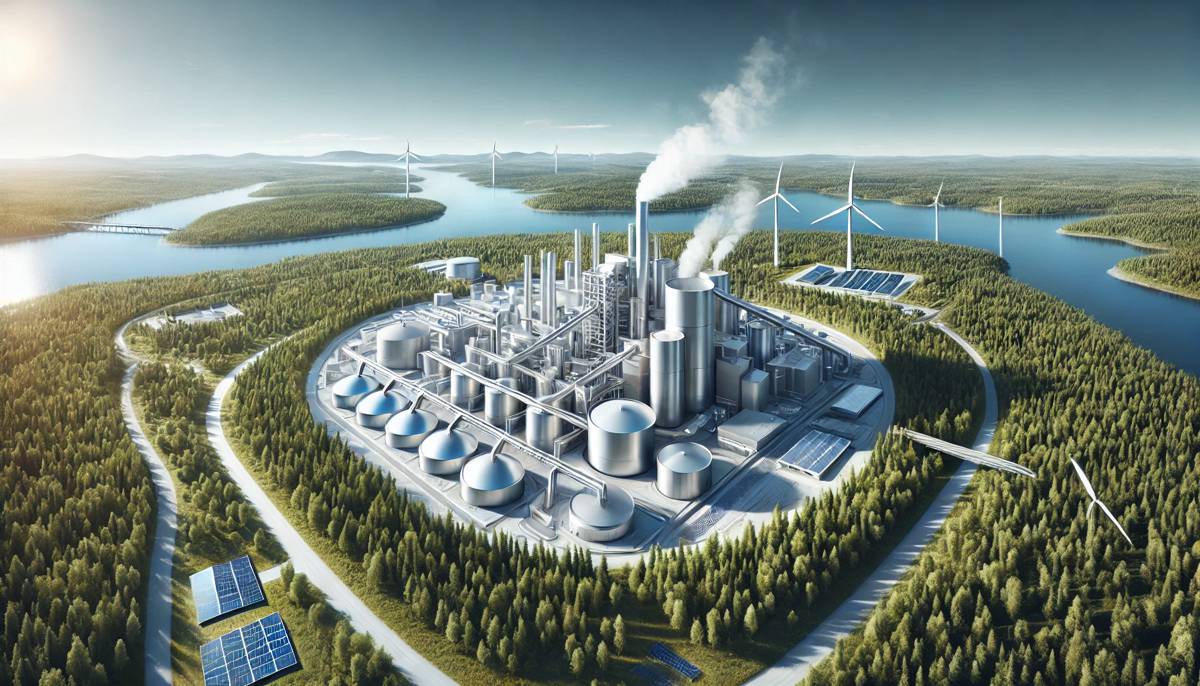Rio Tinto Empowering a Low-Carbon Aluminium Revolution in Finland
In a ground-breaking collaboration, Rio Tinto has joined forces with Swedish investment firm Vargas, Mitsubishi Corporation, and a host of international and Finnish partners to explore the potential for a low-carbon aluminium project in Finland.
This ambitious initiative, spearheaded by the Arctial partnership, marks a significant step forward for sustainable metal production in Europe.
The project, if realised, would be a first for Europe in over three decades, bringing primary aluminium production back to the continent. At its core lies Rio Tinto’s state-of-the-art AP60 technology, which is set to power the proposed smelter in Kokkola, Finland. Known for its efficiency and reduced environmental footprint, the AP60 technology promises a greener future for aluminium production.
But that’s just the beginning. The feasibility study and environmental impact assessment, the initial steps in this venture, will determine the project’s viability. With a focus on utilising renewable energy sources and fostering collaboration between international and local partners, this initiative aims to set a new benchmark for sustainability in the aluminium industry.
Rio Tinto’s Cutting-Edge Technology
At the heart of this partnership is Rio Tinto’s innovative AP60 smelting technology, regarded as one of the most efficient aluminium production methods available today. Developed and tested in Quebec, Canada, the AP60 system has been heralded for its ability to produce high-quality aluminium with a significantly reduced carbon footprint.
This project in Finland marks the first deployment of the AP60 technology outside Canada, a testament to its global appeal and adaptability. By integrating this advanced technology with renewable energy sources, the partnership aims to create a smelter that not only meets but exceeds the demands of a decarbonised future.
Jérôme Pécresse, Chief Executive of Rio Tinto Aluminium, emphasised the importance of this endeavour, stating: “We aim at being a significant investor and off-taker in this partnership, which is aligned with our strategy to strengthen our global leadership in low-carbon aluminium. Combining our AP60 technology with electricity not based on fossil fuels presents an attractive opportunity to provide low carbon aluminium, which will boost Europe’s industrial base and support the manufacturing capabilities required for the energy transition.”
This statement underscores Rio Tinto’s commitment to innovation and sustainability, ensuring its leadership in a rapidly evolving market.
The Role of Renewable Energy
Central to the success of this initiative is the integration of renewable energy sources. The Nordics, renowned for their abundant clean energy potential, play a pivotal role in this respect. Fortum, a leading Nordic energy provider, is on board to supply competitive, carbon-free electricity to power the aluminium smelter.
The partnership will leverage both existing renewable energy infrastructure and explore new opportunities for sustainable energy production. By doing so, the project not only reduces its carbon footprint but also ensures a stable and cost-effective energy supply—an essential factor in the viability of any aluminium smelting operation.
This commitment to sustainability aligns with Europe’s broader goals of achieving net-zero emissions by mid-century, making this project a potential game-changer for the continent’s industrial landscape.
Strategic Partnerships
The Arctial partnership represents a blend of global expertise and local collaboration. In addition to Rio Tinto, Vargas, and Mitsubishi Corporation, Finnish Industry Investment (TESI) and other regional stakeholders have joined the initiative. These partnerships are vital for navigating the complex regulatory, environmental, and logistical challenges inherent in a project of this scale.
By fostering a diverse coalition of industry leaders and local partners, the project ensures a holistic approach to innovation and sustainability. This collaboration also bolsters Finland’s position as a hub for green technology and industrial development.
Why This Matters
The timing of this initiative is significant. With the world transitioning toward renewable energy and carbon neutrality, the demand for low-carbon aluminium is on the rise. Aluminium, a critical material in everything from electric vehicles to renewable energy systems, needs to be produced more sustainably to meet global climate goals.
Europe, in particular, has faced challenges in maintaining a competitive aluminium industry due to high energy costs and environmental concerns. This project, leveraging cutting-edge technology and clean energy, offers a solution that could revitalise Europe’s industrial base and reduce its reliance on imported metals.
The Road Ahead
The feasibility study and environmental impact assessment are just the first steps in what promises to be a transformative journey. If successful, this project could set a precedent for low-carbon aluminium production worldwide, demonstrating how innovation and collaboration can drive sustainable industrial growth.
With Rio Tinto leading the charge, supported by a robust network of international and local partners, the future of aluminium production in Europe looks bright—and green.
Positive Momentum
This ambitious partnership is more than just a business venture; it’s a bold step toward a more sustainable future. By combining advanced technology, renewable energy, and strategic collaboration, Rio Tinto and its partners are paving the way for a cleaner, greener industrial landscape.
As the world continues to grapple with the challenges of climate change, initiatives like this highlight the potential of innovation and cooperation to drive meaningful change. For Europe, this project offers a chance to reclaim its position as a leader in aluminium production while championing sustainability.





























